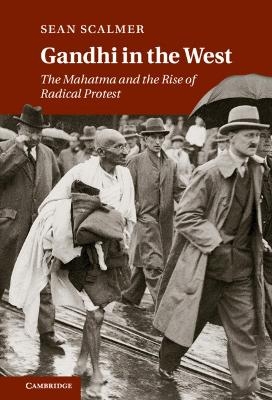
Gandhi in the West
The Mahatma and the Rise of Radical Protest
Seiten
2011
Cambridge University Press (Verlag)
978-0-521-76091-1 (ISBN)
Cambridge University Press (Verlag)
978-0-521-76091-1 (ISBN)
Where did the non-violent protests of the 1960s originate from? This book uncovers their history in an earlier generation's intense struggles to understand and emulate the activities of Mahatma Gandhi. It documents these efforts, traces their influence on later events, and contemplates their significance.
The non-violent protests of civil rights activists and anti-nuclear campaigners during the 1960s helped to redefine Western politics. But where did they come from? Sean Scalmer uncovers their history in an earlier generation's intense struggles to understand and emulate the activities of Mahatma Gandhi. He shows how Gandhi's non-violent protests were the subject of widespread discussion and debate in the USA and UK for several decades. Though at first misrepresented by Western newspapers, they were patiently described and clarified by a devoted group of cosmopolitan advocates. Small groups of Westerners experimented with Gandhian techniques in virtual anonymity and then, on the cusp of the 1960s, brought these methods to a wider audience. The swelling protests of later years increasingly abandoned the spirit of non-violence, and the central significance of Gandhi and his supporters has therefore been forgotten. This book recovers this tradition, charts its transformation, and ponders its abiding significance.
The non-violent protests of civil rights activists and anti-nuclear campaigners during the 1960s helped to redefine Western politics. But where did they come from? Sean Scalmer uncovers their history in an earlier generation's intense struggles to understand and emulate the activities of Mahatma Gandhi. He shows how Gandhi's non-violent protests were the subject of widespread discussion and debate in the USA and UK for several decades. Though at first misrepresented by Western newspapers, they were patiently described and clarified by a devoted group of cosmopolitan advocates. Small groups of Westerners experimented with Gandhian techniques in virtual anonymity and then, on the cusp of the 1960s, brought these methods to a wider audience. The swelling protests of later years increasingly abandoned the spirit of non-violence, and the central significance of Gandhi and his supporters has therefore been forgotten. This book recovers this tradition, charts its transformation, and ponders its abiding significance.
Sean Scalmer is a Senior Lecturer in the School of Historical Studies, University of Melbourne. He is author of two books on the history of social movements - Dissent Events: Protest, the Media, and the Political Gimmick in Australia (2002) and The Little History of Australian Unionism (2006). He is also co-author with Sarah Maddison of Activist Wisdom: Practical Knowledge and Creative Tension in Social Movements and co-editor with Stuart Macintyre of What If? Australian History as It Might Have Been (2006).
Introduction; 1. Meeting the Mahatma; 2. Gandhism in action; 3. At war over words; 4. Waiting for the peace train; 5. The experimenters; 6. An idea whose time has come?; 7. Transformations unforeseen; Conclusion.
| Erscheint lt. Verlag | 6.1.2011 |
|---|---|
| Verlagsort | Cambridge |
| Sprache | englisch |
| Maße | 159 x 235 mm |
| Gewicht | 540 g |
| Themenwelt | Geschichte ► Allgemeine Geschichte ► Neuzeit (bis 1918) |
| Geisteswissenschaften ► Geschichte ► Regional- / Ländergeschichte | |
| Sozialwissenschaften ► Politik / Verwaltung ► Europäische / Internationale Politik | |
| ISBN-10 | 0-521-76091-7 / 0521760917 |
| ISBN-13 | 978-0-521-76091-1 / 9780521760911 |
| Zustand | Neuware |
| Informationen gemäß Produktsicherheitsverordnung (GPSR) | |
| Haben Sie eine Frage zum Produkt? |
Mehr entdecken
aus dem Bereich
aus dem Bereich
Giordano Bruno - ein ketzerisches Leben
Buch | Hardcover (2024)
C.H.Beck (Verlag)
CHF 41,85
das dramatische 16. Jahrhundert
Buch | Hardcover (2024)
Rowohlt Berlin (Verlag)
CHF 47,60


